CDC Pilots WASH Training for Outbreak Response in Sierra Leone
Publication date: March 25, 2019
Sierra Leone battled cholera in 2012, Ebola in 2014, and a devastating mudslide in 2017 that killed hundreds of people and left hundreds more homeless. Officials in Sierra Leone are looking to CDC’s water, sanitation, and hygiene (WASH) training and its new global toolkit to help them build a strong infrastructure and workforce and be better prepared for future disasters or outbreaks.
In this West African country, only 2% of the population has access to clean, readily available drinking water. In 2017, 16% of households in Sierra Leone had access to basic sanitation and 23% to soap and water. CDC is working with Sierra Leone to address these challenges.
Public health officials, partners, and stakeholders in Sierra Leone asked CDC to help strengthen the country’s WASH workforce to combat diseases such as cholera, dysentery, hepatitis A, typhoid, and polio. In our interconnected world, disease threats in a remote village in West Africa can have an impact on people thousands of miles away. CDC invests heavily in global public health training and capacity building to ensure countries are fully prepared to prevent, detect, and respond to infectious disease threats.
Outbreak Investigation Training
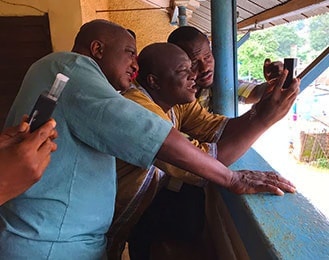
Water analysts read results of a water quality test.*
In July and August, CDC used the toolkit to conduct training for more than 50 public health staff on how to detect and respond to waterborne diseases, such as cholera and typhoid. The Sierra Leone Ministry of Health and Sanitation (MoHS) and the Ministry of Water Resources (MoWR) assisted. Students were from the following groups:
- Field Epidemiology Training Program (FETP) students;
- Community Health Officer Management and Leadership Training Program facilitators;
- Water technicians, analysts, and engineers from across the country who work for the Ministry of Water Resources.
Staff from CDC’s Division of Foodborne, Waterborne, and Environmental Diseases (DFWED) conducted the training alongside staff from the CDC Division of Global Health Protection based in Sierra Leone.
How to Collect Water Samples
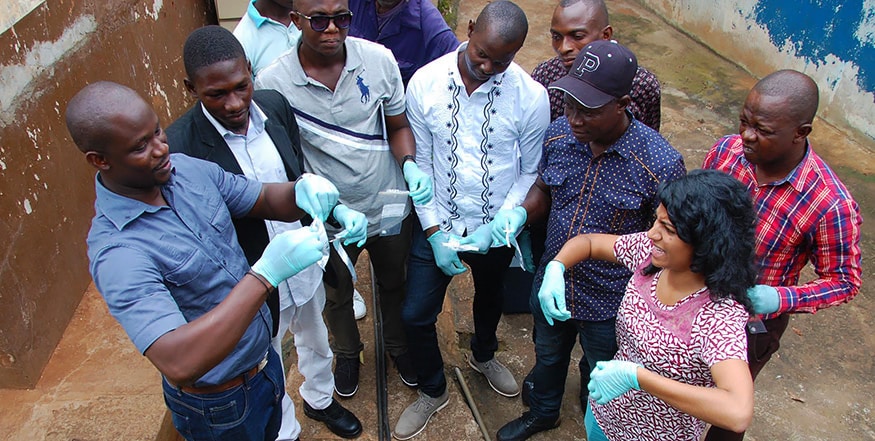
CDC environmental microbiologist Gouthami Rao (front row, right) shows water engineers from across Sierra Leone how to collect a water sample from a pump in Freetown.*
In the MoWR classroom, CDC environmental microbiologist Gouthami Rao described how latrines, animals, and humans can contaminate surface water and ground water.
She discussed how to make water safe, for example by using chlorine, and she demonstrated how to conduct microbiological tests on water samples to determine if they are contaminated.
She walked students through different technical methods and tools to test for total coliforms, Escherichia coli bacteria, free chlorine residual, and turbidity. Few of these tools are available in Sierra Leone, and routine water quality testing is not standard.
Then she showed them how to collect a water sample. First, Rao distributed supplies to take to the field: latex gloves, Whirl-Pak bags to collect the sample, a marker to label the sample, cotton, and a disinfectant to sterilize the tap. Participants also received a cooler to hold the water samples and paper and pen to record where and when the sample was collected.
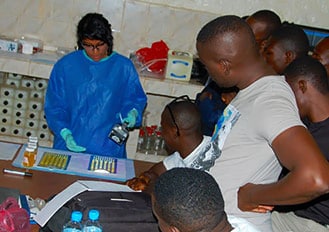
Environmental microbiologist Gouthami Rao holds a black light over a water sample to see if it will glow, indicating contamination.*
At the tap, she demonstrated the proper collection technique, then observed as each student collected a sample. Afterward, the group walked back to the MoWR to test them.
Testing Water Quality
The MoWR building has a rudimentary laboratory powered by a portable generator on the lawn. In the lab, students talked about how they collected samples as Rao donned protective gear, including safety goggles. She then demonstrated how to use an ultraviolet light to test water samples for contamination.
Community Health Officer mentors who were trained will now train the country’s 500 Community Health Officers, who often work on the front lines of disease outbreaks. Others, such as Field Epidemiology Training Program graduates, will incorporate the training into their work.
Outbreak Investigations Require Teamwork
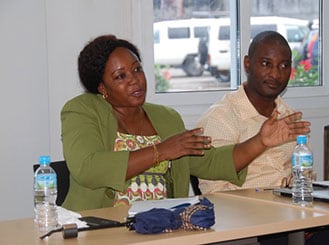
A Community Health Officer makes a point during CDC training in Sierra Leone.*
After the training, students said they were better prepared to respond to outbreaks of cholera and other infectious diseases spread through food and water. Learning about the proper use of cholera rapid diagnostic tests was also valuable, and hands-on experiments to test water quality was a highlight, students said.
They reported that they understand that effective outbreak investigations require teamwork, and integrating and analyzing epidemiological data, laboratory results, and environmental testing. “Sometimes the steps are happening simultaneously, and you must make decisions as you get the information,” trainers emphasized.
Participants also learned about communicating with the public during a disease outbreak. Trainers discussed that it can be tricky, and each case is unique. “When you have an action the public can take to protect their health, that’s the best time to communicate,” trainers said.
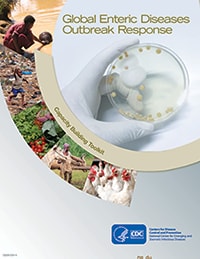
Cover of CDC’s Global Enteric Diseases Toolkit.
CDC’s WASH curriculum was piloted in Sierra Leone, which is prone to flooding and waterborne disease outbreaks. Other parts of the curriculum have been tested in Cameroon and Kenya. CDC anticipates testing the toolkit next in Ethiopia.
The goal is to launch the WASH toolkit on CDC TRAIN, an online learning platform, so public health professionals working in epidemiology, environmental health, clinical microbiology, and environmental microbiology around the world can learn how to respond quickly to disease outbreaks.
Next Steps in Sierra Leone
Next steps in Sierra Leone include continuing to strengthen the WASH workforce with this curriculum by training other key public health partners, including those in universities.
“There’s what you learn in the book, then there’s what happens in the real world,” one student said. “We must share this knowledge with others to help our country.”